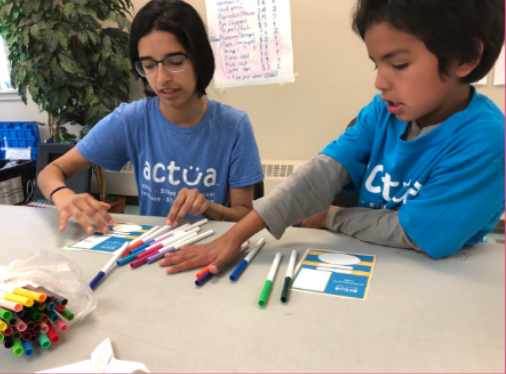3. The Actua Instructor Experience
The Actua Instructor Training and Work Experience Program
As an instructor at one of Actua’s Network Member programs, you will receive training on multiple topics and subject areas to help you deliver high quality, impactful STEM programming for youth - this is Actua’s key objective. Through this training you will be better supported in your role as an instructor.
Additionally, this training program has been designed to thoughtfully engage you in training and skills development that will support you to be prepared for your future of work. The last activity started to question you about the skills and personal development a STEM program instructor may offer you. This is at the heart of what this training is about. We know that the transferable skill areas we articulate as Future Skills are the most in-demand by all sorts of different types of industries and employers. By being an Actua Network Member instructor you will be exposed to training such as; Conflict Resolution, Indigenous Worldviews, Communicating with Parents, and more. These training offerings provide instruction on their topic areas, but also deliver insight on areas like; Problem Solving, Innovation & Creativity, Leadership and more.
Keep this in mind throughout your time as an instructor!
Actua’s Future Skills List
This is the list of skills that we have identified as Actua’s Future Skills. These are supported by other research and industry skills focuses, such as the skills highlighted in university and college work integrated learning or experiential learning programs, or the RBC Future Launch project. Other institutions, industries, associations, academic programs, and governments have sets of skills that are valuable as well and that may not appear on this list. The Actua future skills list is not a complete list of all valuable future skills, but does connect many of the overlapping skills across these different key stakeholders.
We have divided this list into three categories: Delivering results, Working with Others, and Future Readiness.
I encourage you to take a close look at the Future Skills Defined page in your workbook to explore the definitions and descriptions of each of the skills listed here.
Delivering Results | Working with Others | Future Readiness |
Problem Solving | Teamwork and Collaboration | Adaptability and Flexibility Innovation and Creativity Ability and Eagerness to Learn Building Networks Digital Literacy Financial Literacy |
The Big Five: Instructors and Future Skills
Across the RBC Future Skills Survey, and the Actua Future Skills Qualitative Research project we have identified 5 key future skills that instructors are readily developing and strengthening across the network.
- Teamwork & Collaboration
- Communication
- Social Intelligence
- Adaptability & Flexibility
- Innovation & Creativity
In your workbook, you can dive deeper and explore these skills, what they mean, and how using these skills may look in practice. It is important to be able to correlate a skill you have with the experiences and/or training that has supported the development of the skill.
For example:
Communication -- developed through daily responsibilities to communicate STEM concepts in a teaching and lesson plan format as well as interpersonal communications with parents of students, this being supported by a training module called ‘Communicating with Parents’.
Here are the definitions of each of the Big Five Future Skills that instructors are primed to develop in their roles.
1. Teamwork & Collaboration
 Demonstrates respect for diverse opinions, backgrounds, values , beliefs and contributions of others.
Demonstrates respect for diverse opinions, backgrounds, values , beliefs and contributions of others.- Recognizes, honours, and leverages the strengths of others for the good of the team.
- Deals effectively and tactfully with adversity in a group.
2. Communication
- Considers audience expectations when crafting messages.
- Adapts messages to suit the (unique) needs of the audience.
- Presents material/information in a way that is engaging, and that is appropriately targeted to the audience.
- Aptly leverages resources to support/reinforce key messaging.
- Interacts effectively with a variety of stakeholders.
 Listens attentively.
Listens attentively.
3. Social Intelligence
- Recognizes and appreciates the feelings and emotions of others through studying both verbal and non-verbal cues.
- Adapts their own approach to suit the intended audience.
- Appreciates the value of diversity and advocates for underrepresented audiences.
4. Adaptability & Flexibility
 Demonstrates a willingness to alter or change one's own course of action, behaviour, or approach as the situation merits.
Demonstrates a willingness to alter or change one's own course of action, behaviour, or approach as the situation merits.
5. Innovation & Creativity
- Conceives or implements new ideas, methods or approaches.
- Finds, generates or creates something unique or that has not been tried before.
- Experiments and applies existing knowledges or practices in new and unique ways.
Minds On: Do you feel these 5 skills are among the strongest skill areas where you have developed? Taking time to think carefully and critically about information you are presented with is part of Critical Thinking and Analysis. Can you think of other skill areas that were more significant for yourself and why? “Change is coming fast, making it hard to know what jobs will look like a decade from now. We need a new way of thinking about job requirements. Developing human skills — things like critical thinking, judgment, and decision-making — will empower young people to pivot between careers and across sectors even as job descriptions change.” - RBC Future Launch |
Viewed 4,240 times